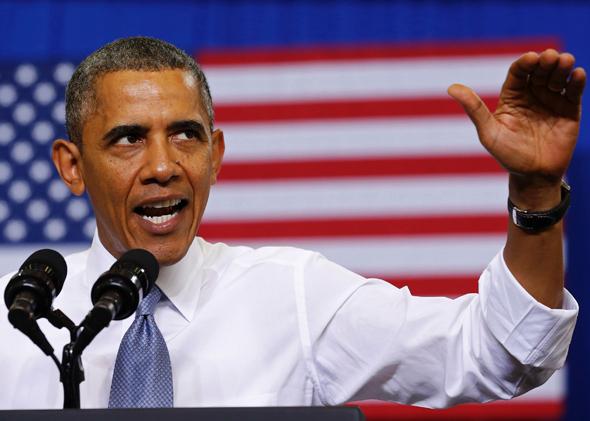In the message war over the debt ceiling, the first big weapon has been fired. Its name is “economic shutdown.”
Everyone knows the phrase “government shutdown.” That’s how Democrats describe the failure of Congress to agree on legislation funding the government. In the 1990s, when Republicans withheld money, using the power of the purse to control spending, President Clinton and the Democrats accused them of shutting down the government. The term “shutdown” made Republicans look as though they, not the president, were deciding which programs and offices to close. In November 1996, Clinton was decisively re-elected.*
In the Nexis archive of news articles and political transcripts, there’s no record of the words “economic shutdown” during those battles. The economy was strong. Two years ago, a few congressional Republicans used this phrase to describe what liberal economic policies were doing to the private sector. The first Democrat I can find who used the term in the context of the debt ceiling is former Rep. Kathy Hochul, D-N.Y. Appalled by the 2011 standoff between congressional Republicans and President Obama, Hochul accused her colleagues of playing “chicken” with people’s lives. She warned them that the country was “on the precipice of not just a government shutdown but an intentional economic shutdown.”
Hochul didn’t explicitly blame the GOP. “What happens when no one blinks, no one swerves, no one comes to their senses?” she asked. A week later, writing in the Atlantic, Democratic strategist Krystal Ball turned this into a partisan critique. Ball denounced “the current debt-ceiling hostage situation in which Republicans, led by tea party extremists, decided to threaten not only a government shutdown but total economic shutdown.”
Over the next two years, the phrase was rarely uttered. Rep. Kurt Schrader, D-Ore., and Sen. Dick Durbin, D-Ill., used it to describe the 2011 debt ceiling impasse, and Durbin blamed the GOP—“The Tea Party of the House of Representatives and their followers in the Senate said, ‘We’re prepared to shut down the economy of America’ ”—but only in retrospect.
Two weeks ago, the term reappeared. The press secretary for the Democratic Congressional Campaign Committee blasted Rep. Erik Paulsen, R-Minn.: “Minnesota voters want Congressman Paulsen to stop giving handouts to the ultra-wealthy and instead pay the country’s bills and prevent economic shutdown.” A week later, Senate Majority Leader Harry Reid chided the GOP for dragging its feet on funding the government and raising the debt ceiling: “While Republicans in Washington use these stunts to raise money and grab headlines, people in Nevada and around the country are going to feel the pain of this economic shutdown.”
Yesterday, in a speech outlining the Affordable Care Act, President Obama turned the volume way up. “Some have threatened a government shutdown if they can’t shut down this law,” he charged. “Others have actually threatened an economic shutdown by refusing to pay America’s bills if they can’t delay the law.” Obama accused “the Tea Party Republicans” of “threatening either to shut down the government, or shut down the entire economy by refusing to let America pay its bills. … No Congress before this one has ever—ever—in history been irresponsible enough to threaten default, to threaten an economic shutdown, to suggest America not pay its bills, just to try to blackmail a president.”
That’s three allegations of “economic shutdown” in a few minutes. Obama isn’t using the phrase casually. He’s making it a weapon. “Economic shutdown” is supposed to do for the debt ceiling what “government shutdown” did for failure to authorize appropriations. Its job is to draw a neat cause-and-effect line from congressional inaction to grim, complex consequences. Ratings agencies will downgrade U.S. credit, stocks will dive, people will be laid off, and all of it will be the fault of Republicans who, by failing to act, “shut down the economy.”
“Government shutdown” won an election and damaged the Republican brand for years. Don’t be surprised if “economic shutdown” does the same.
Read more of Slate’s coverage of the debt ceiling fight.
*Correction, Sept. 27, 2013: This article originally said that in 1996, Republicans lost seats in both the House and the Senate. In fact, they lost three seats in the House but picked up two in the Senate. (Return to the corrected sentence.)
